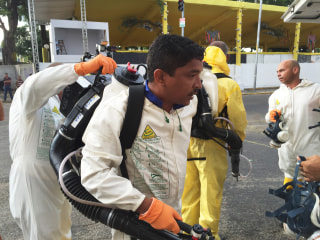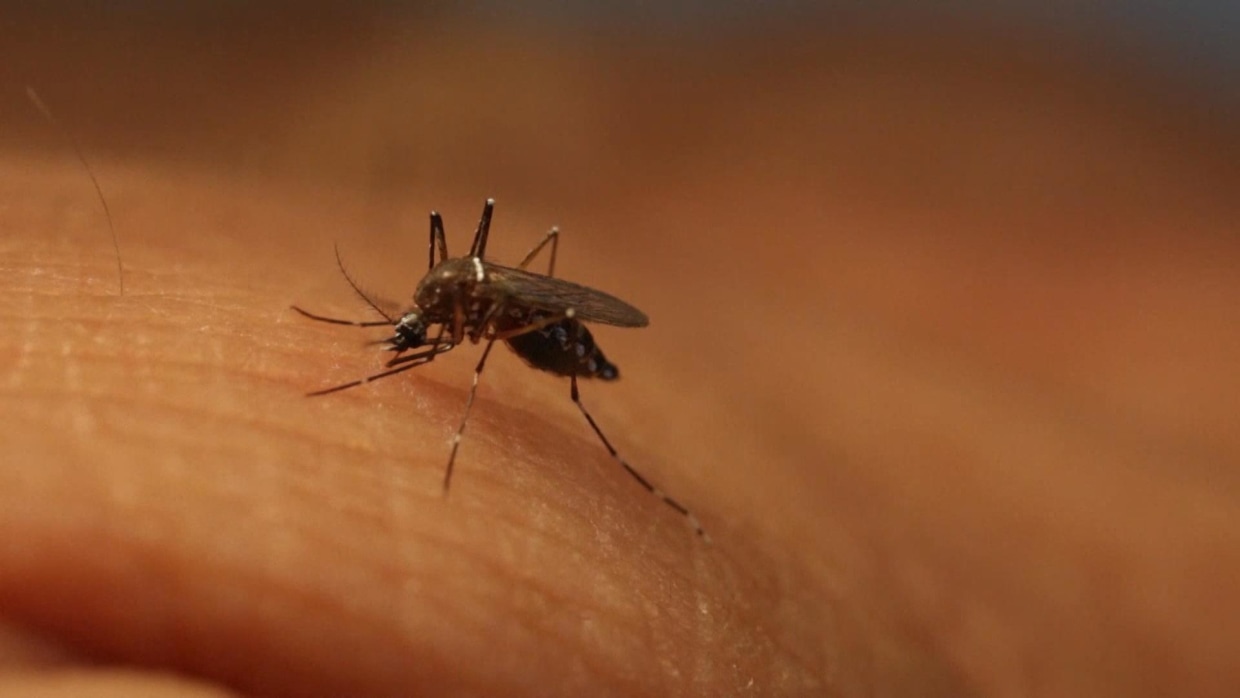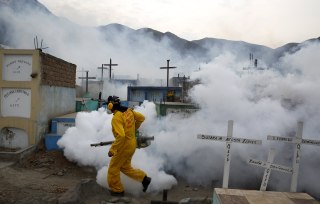NND 坡坡都木说zika来自米蒂
它倒担心 worry个头啊
Zika Worsens in Singapore, and U.S. Experts Are Worried
Singapore's outbreak of Zika is worsening fast and U.S. health official say they are worried.
Singapore, a city-state about two-thirds the size of Washington, D.C., has 115 confirmed cases of the viral infection spread by local mosquitoes. The Centers for Disease Control and Prevention has added Singapore to its list of Zika-affected countries that pregnant women should avoid.
The U.S. now has 47 home-grown cases, all in Florida. Florida health officials added one more case to the count Wednesday.
The jump to Singapore is worrying, health experts say. "I really think we need to keep our eye on Singapore, among other places," said Dr. Tony Fauci, head of the National Institute of Allergies and Infectious Diseases.
"It went from a handful of cases to 50, to 80 and now it's well over 100 cases," Fauci told a session on Zika at Georgetown University law school Wednesday.
 Workers prepare to spray insecticide to combat the spread of the Zika virus in Recife, Brazil, on Feb. 3, ahead of Carnival. The city expects more than a million visitors for the celebration.
"Any time there is a disease outbreak in Singapore, it tells us how difficult that disease is to control," CDC director Dr. Tom Frieden told reporters.
Workers prepare to spray insecticide to combat the spread of the Zika virus in Recife, Brazil, on Feb. 3, ahead of Carnival. The city expects more than a million visitors for the celebration.
"Any time there is a disease outbreak in Singapore, it tells us how difficult that disease is to control," CDC director Dr. Tom Frieden told reporters.
That's because Singapore has a tight system for controlling disease. It made Zika a notifiable disease, meaning any doctor who diagnoses a Zika case must inform the government.
Related: Questions About Zika and Pregnancy
"To prevent Zika from becoming entrenched in our local population, all confirmed cases will be admitted to a public hospital until they recover and test negative for the virus," Singapore's National Environmental Agency (NEA) says in a statementon its website.
"(The Ministry of Health) will also screen people in close vicinity of the case (e.g. household, colleagues) for the Zika virus."
"ANY TIME THERE'S DISEASE IN SINGAPORE, WE SAY THAT DISEASE IS HARD TO CONTROL."Singapore is home to the Aedes mosquitoes that spread Zika, and has struggled to fight dengue virus, a close relative of Zika that's spread by the same mosquitoes.
What impresses Frieden is Singapore's team of inspectors, who keep an eye out for the standing water that breeds mosquitoes. The Aedes mosquitoes that spread Zika virus are notorious for breeding in small containers such as potted plants or trash.
"As a pre-emptive approach, NEA conducts regular inspections at residential and commercial premises to remove the breeding habitats of vectors and prevent the transmission of diseases," it said.
"Where lapses are found, fines and other penalties will be levied."
These measures tend to be very effective.
Related: Who Should Worry About Zika
"Any time there's disease in Singapore, we say that disease is hard to control," Frieden said.
 FacebookTwitterGoogle PlusEmbed
Pregnant and Worried About Zika? Some Tips 0:40
Teams from Florida's Department of Health are visiting areas of Miami Beach to try to find people who may have been infected with Zika. The virus doesn't cause symptoms in most people and only mild symptoms, usually, in those who do get sick, so they are asking people to voluntarily give blood or urine samples to see if they've been infected.
FacebookTwitterGoogle PlusEmbed
Pregnant and Worried About Zika? Some Tips 0:40
Teams from Florida's Department of Health are visiting areas of Miami Beach to try to find people who may have been infected with Zika. The virus doesn't cause symptoms in most people and only mild symptoms, usually, in those who do get sick, so they are asking people to voluntarily give blood or urine samples to see if they've been infected.
But the U.S. and state governments have not taken steps such as forcing people infected with Zika to be hospitalized. Forced quarantine or isolation is considered an extreme step and it's usually up to states. New Jersey Gov. Chris Christie came under fire from medical organizations and advocates for forcing Doctors Without Borders nurse Kaci Hickox into quarantine in 2015 when she returned from an Ebola-affected area of Africa.
 A health worker carries out fumigation as part of preventive measures against the Zika virus and other mosquito-borne diseases at the cemetery of Carabayllo on the outskirts of Lima, Peru on February 1. MARIANA BAZO / Reuters
Related: Forced Ebola Quarantines Were Stupid and Wrong
A health worker carries out fumigation as part of preventive measures against the Zika virus and other mosquito-borne diseases at the cemetery of Carabayllo on the outskirts of Lima, Peru on February 1. MARIANA BAZO / Reuters
Related: Forced Ebola Quarantines Were Stupid and Wrong
The CDC and state health officials have been struggling to control mosquitoes. The CDC recommended widespread spraying in Puerto Rico to control the epidemic of Zika there, but stopped trying after a widespread outcry.
In contrast, both aerial spraying for adults and use of larvicides to kill baby mosquitoes worked well in helping control an outbreak of Zika in Miami's Wynwood neighborhood, Frieden said.
"What we have seen is a very dramatic reduction in populations of the Aedes mosquitos there," Frieden said.
CDC wants to roll out and test better mosquito traps as well, but is waiting for Congress to appropriate the money to do it. Congress returns Tuesday from a summer break.
http://goo.gl/hmcng4
Singapore, a city-state about two-thirds the size of Washington, D.C., has 115 confirmed cases of the viral infection spread by local mosquitoes. The Centers for Disease Control and Prevention has added Singapore to its list of Zika-affected countries that pregnant women should avoid.
The U.S. now has 47 home-grown cases, all in Florida. Florida health officials added one more case to the count Wednesday.
The jump to Singapore is worrying, health experts say. "I really think we need to keep our eye on Singapore, among other places," said Dr. Tony Fauci, head of the National Institute of Allergies and Infectious Diseases.
"It went from a handful of cases to 50, to 80 and now it's well over 100 cases," Fauci told a session on Zika at Georgetown University law school Wednesday.
 Workers prepare to spray insecticide to combat the spread of the Zika virus in Recife, Brazil, on Feb. 3, ahead of Carnival. The city expects more than a million visitors for the celebration.
"Any time there is a disease outbreak in Singapore, it tells us how difficult that disease is to control," CDC director Dr. Tom Frieden told reporters.
Workers prepare to spray insecticide to combat the spread of the Zika virus in Recife, Brazil, on Feb. 3, ahead of Carnival. The city expects more than a million visitors for the celebration.
"Any time there is a disease outbreak in Singapore, it tells us how difficult that disease is to control," CDC director Dr. Tom Frieden told reporters.That's because Singapore has a tight system for controlling disease. It made Zika a notifiable disease, meaning any doctor who diagnoses a Zika case must inform the government.
Related: Questions About Zika and Pregnancy
"To prevent Zika from becoming entrenched in our local population, all confirmed cases will be admitted to a public hospital until they recover and test negative for the virus," Singapore's National Environmental Agency (NEA) says in a statementon its website.
"(The Ministry of Health) will also screen people in close vicinity of the case (e.g. household, colleagues) for the Zika virus."
"ANY TIME THERE'S DISEASE IN SINGAPORE, WE SAY THAT DISEASE IS HARD TO CONTROL."Singapore is home to the Aedes mosquitoes that spread Zika, and has struggled to fight dengue virus, a close relative of Zika that's spread by the same mosquitoes.
What impresses Frieden is Singapore's team of inspectors, who keep an eye out for the standing water that breeds mosquitoes. The Aedes mosquitoes that spread Zika virus are notorious for breeding in small containers such as potted plants or trash.
"As a pre-emptive approach, NEA conducts regular inspections at residential and commercial premises to remove the breeding habitats of vectors and prevent the transmission of diseases," it said.
"Where lapses are found, fines and other penalties will be levied."
These measures tend to be very effective.
Related: Who Should Worry About Zika
"Any time there's disease in Singapore, we say that disease is hard to control," Frieden said.
 FacebookTwitterGoogle PlusEmbed
Pregnant and Worried About Zika? Some Tips 0:40
Teams from Florida's Department of Health are visiting areas of Miami Beach to try to find people who may have been infected with Zika. The virus doesn't cause symptoms in most people and only mild symptoms, usually, in those who do get sick, so they are asking people to voluntarily give blood or urine samples to see if they've been infected.
FacebookTwitterGoogle PlusEmbed
Pregnant and Worried About Zika? Some Tips 0:40
Teams from Florida's Department of Health are visiting areas of Miami Beach to try to find people who may have been infected with Zika. The virus doesn't cause symptoms in most people and only mild symptoms, usually, in those who do get sick, so they are asking people to voluntarily give blood or urine samples to see if they've been infected.But the U.S. and state governments have not taken steps such as forcing people infected with Zika to be hospitalized. Forced quarantine or isolation is considered an extreme step and it's usually up to states. New Jersey Gov. Chris Christie came under fire from medical organizations and advocates for forcing Doctors Without Borders nurse Kaci Hickox into quarantine in 2015 when she returned from an Ebola-affected area of Africa.
 A health worker carries out fumigation as part of preventive measures against the Zika virus and other mosquito-borne diseases at the cemetery of Carabayllo on the outskirts of Lima, Peru on February 1. MARIANA BAZO / Reuters
Related: Forced Ebola Quarantines Were Stupid and Wrong
A health worker carries out fumigation as part of preventive measures against the Zika virus and other mosquito-borne diseases at the cemetery of Carabayllo on the outskirts of Lima, Peru on February 1. MARIANA BAZO / Reuters
Related: Forced Ebola Quarantines Were Stupid and WrongThe CDC and state health officials have been struggling to control mosquitoes. The CDC recommended widespread spraying in Puerto Rico to control the epidemic of Zika there, but stopped trying after a widespread outcry.
In contrast, both aerial spraying for adults and use of larvicides to kill baby mosquitoes worked well in helping control an outbreak of Zika in Miami's Wynwood neighborhood, Frieden said.
"What we have seen is a very dramatic reduction in populations of the Aedes mosquitos there," Frieden said.
CDC wants to roll out and test better mosquito traps as well, but is waiting for Congress to appropriate the money to do it. Congress returns Tuesday from a summer break.
http://goo.gl/hmcng4
请先 登录 后评论
- 0 关注
- 0 收藏,809 浏览
- 于策 提出于 2019-07-19 20:39
相似问题
- 想买个披肩 2 回答
- Be careful with this fruit. 1 回答
- Spinach from china - IMPORTANT! 0 回答
- 湖南人家晚餐归来 0 回答
- 谢谢大家的支持,这次consumer test提前结束 0 回答
- 关于非典型性肺炎SARS。。。 作者:红杉树(z) 0 回答